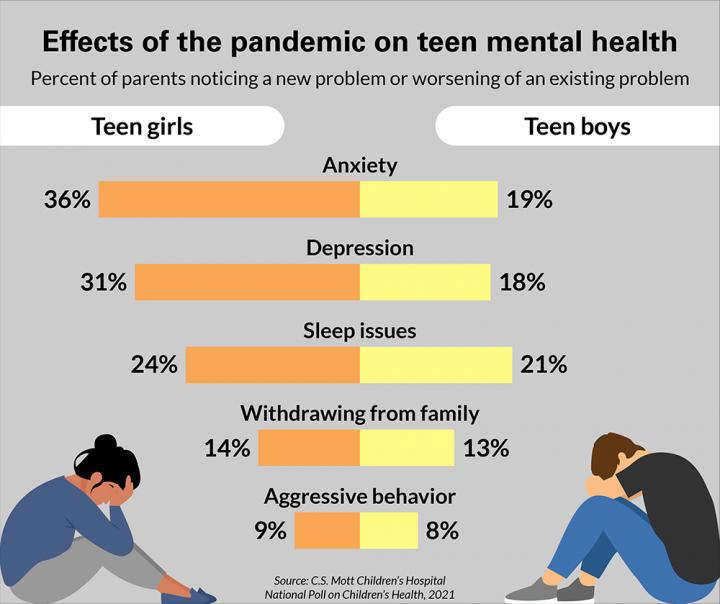
Covid-19 pandemic restrictions has taken a major emotional toll on U.S. teens, with nearly half of parents reporting signs of new or worsening mental health conditions — such as anxiety or depression — in their children since March 2020, according to results from a national poll.
Warnings of the mental health fallout following in the wake of the Covid-19 pandemic were circulating as early as April 2020, and pandemic-related anxiety, depression, and other mental health issues remained high well into the fall of last year. And, according to the C.S. Mott Children’s Hospital National Poll on Children’s Health at Michigan Medicine, U.S. teens were particularly hard hit, with teen girls most likely to display depressive symptoms and anxiety.
The nationally representative poll, which was based on responses from 977 parents of teens ages 13-18, reported that 46% of respondents noted their teen has shown signs of a new or worsening mental health condition since the start of the pandemic — and, notably, there were substantial differences in rates of certain pandemic-related mental health changes by gender:
- Parents of teen girls were more likely to report an increase in anxiety than parents of teen boys (36% versus 19%).
- Parents of teen girls were more likely to report an increase in depression than parents of teen boys (31% versus 18%).
In contrast, similar proportions of parents reported negative changes in their teen’s sleep patterns (24% versus 21%), withdrawing from family (14% versus 13%), and aggressive behavior (8% versus 9%).
“Although serious illness from Covid-19 is uncommon among teens, the changes brought on by the pandemic have wreaked havoc on their lives,” report author Sarah J. Clark, MPH, of the Department of Pediatrics at the Susan B. Meister Child Health Evaluation and Research Center at Michigan Medicine in Ann Arbor, Michigan, and colleagues wrote. “Many have experienced disruptions to their normal routines including closed schools, canceled activities and an inability to hang out with friends and extended family… At just the age when they are biologically primed to seek independence from their families, restrictions to control the Covid-19 pandemic have kept teens at home. As a result, most parents in this Mott Poll reported that Covid-19 has had a substantial negative impact on their teen’s ability to interact with their friends. It is no surprise that many teens are feeling frustrated, anxious and disconnected due to social distancing and disruption of their usual schedules for school and outside activities.”
But is there anything that parents can do? Fortunately, Clark and colleagues noted, some parents reported success in improving their teen’s mental health by using a range of strategies.
“Half (52%) have tried relaxing family Covid-19 rules to allow their teen to have more contact with friends; most of these (81%) say it has helped,” they wrote. “Similarly, half of parents (47%) have tried relaxing family rules about social media; most (70%) report it helped. One-third of parents (34%), report talking with teachers or school counselors, with over half (57%) saying it helped. One in four parents (29%) report seeking help for their teen from a mental health provider, with most (74%) feeling it helped. One-third of parents (32%) report looking for information on the internet, with 58% saying it helped; and one-quarter of parents (25%) report encouraging their teen to try web-based program or an app to improve their mental health, and 60% say it has helped.”
However, Clark and colleagues also acknowledged that, while parents have a critical role in helping their teens cope with pandemic-related stress, it may not be quite as easy for the one in seven parents who reported their teen has withdrawn from the family.
“Mental health experts advise that one of the most important things for parents to do is keep lines of communication open; ask their teen how they are doing and create the space for them to speak honestly so they can provide help when needed. Parents also need to remember it is normal for teens to crave privacy from their family. Giving them space for some quiet time, creative time or music time can be helpful to their mental health.”
And, Clark and colleagues added, a good night’s sleep is extremely important. The report authors advised that parents whose teens are losing sleep should consider helping them practice proper sleep hygiene, “including a regular sleep and wake time that fits with their online learning schedule and their interactions with peers and family.”
John McKenna, Associate Editor, BreakingMED™
Cat ID: 146
Topic ID: 87,146,730,190,926,192,146,52,55,151,925


